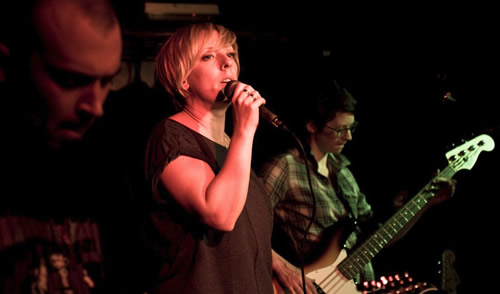London / Newcastle-Upon-Tyne based band Crumbling Ghost released their follow up to their 2009 debut in June with an expanded line-up of a new bass player in the form of Ruth Atkins and Katie Harnett on vocals. The album II bursts into life with a heavy drone intro that will tempt you to crank it up a few notches as the intro segues into a Primitive Methodist hymn The Good Old Way which featured on The Watersons For Pence and Spicy Ale (Topic 1975). The climatic intro is forewarning to those new to the music of Crumbling Ghost that they play traditional folk songs, alongside their own compositions, like no other.
There is a pattern of respite and disturbance throughout the album as on Black Wax which opens to heavy doom laden guitars and acoustic respite whilst La Rotta a medieval tune from 14th century Italy (found on John Renbourn’s 1970 album ‘The Lady and the Unicorn’ and The Albion Country Band’s 1976 album ‘Battle of the Field’) turns this around later descending into progressive territory and rising again at the end for a lovely acoustic outro.
Standout tracks have got to include Poor Murdered Woman which featured on Shirley Collins (a woman who many lay the roots of experimental folk at the feet of) and the Albion Country Band’s groundbreaking album No Roses (1971) for which Simon Houlihan and Paul James produced a very special show earlier this year for Folk Radio UK which featured an interview with the English Folk legend (listen here). Katie Harnett’s vocals are sympathetic and really shine on this track from which they omit the final verse: “as in Carthy’s version we have left out the Final verse, so avoiding framing the song with an overtly religious tone.”
Their cover of Reynardine is another standout moment on which Katie Harnett does great justice, they include these notes on the origin:
This is one of the most frequently performed songs of the 1960s folk revival. It tells the story of a woman who is hypnotised into submission by a ‘werefox’ she encounters in the hills. Fairport Convention, June Tabor, Anne Briggs, Bert Jansch and Martin Carthy are some of the notable artists who have recorded the song. It originates from variations of the ballad ‘The Mountains High’ which were mostly collected in the 19th century. However, at this stage the song contained no mythical references. Later, in 1909 Joseph Campbell and Herbert Hughes published written accounts of the song (now called ‘Reynardine’) from a version they heard in Kilmacrenan, Ireland in which supernatural characteristics were applied to the protagonist. Hughes’s account featured the line ‘His eyes did brightly shine’ (Hughes’s Irish Country Songs, 1909). Nearly sixty years later A.L. Lloyd included the song on his 1966 Album ‘First Person’ with amendments including ‘His teeth did brightly shine’. It is this text that was subsequently adopted by the folk revivalists and from those versions that our recording is based. Lloyd originally tried to pass his reworking off as the authentic traditional text, claiming that he collected the song from a ‘Tom Cook in Suffolk’. However, he later stated that the words and tune were adapted from an Irish original.
After an epic instrumental with The Submerged Forest the album bows out on a lovely sedate acoustic track All Things Are Quite Silent:
This song is a lamentation of a woman whose husband was press-ganged into joining the Navy during the Napoleonic Wars. It was collected by Ralph Vaughan Williams in 1904 from the singing of Ted Baines, Lower Beeding, Sussex. Our arrangement is based on Shirley Collins’ recording from her 1967 LP ‘The Sweet Primroses’.
The album is original and unrestrained in its approach, they are not about revivalism they’re about renewal. Order it via Bandcamp.
http://crumblingghost.blogspot.co.uk/

